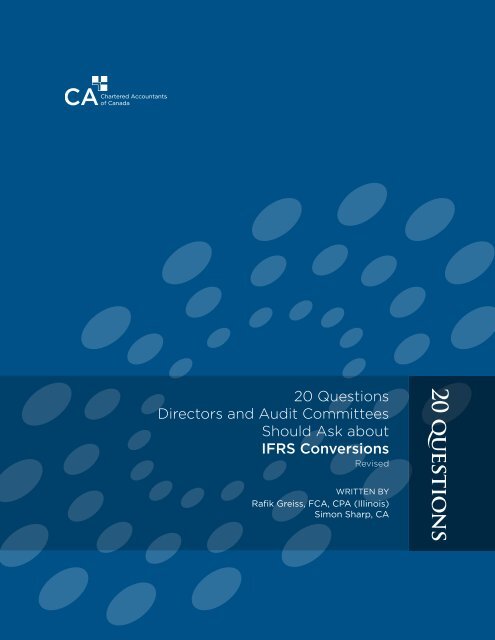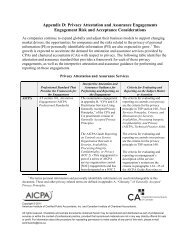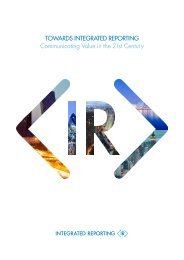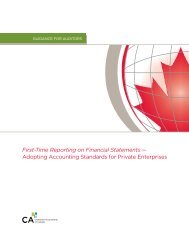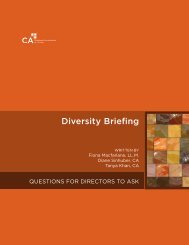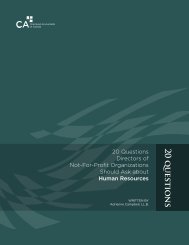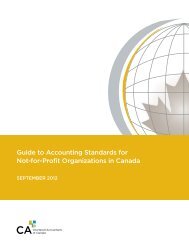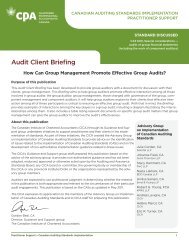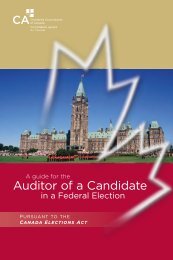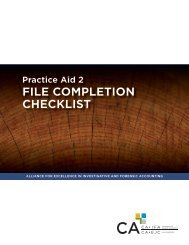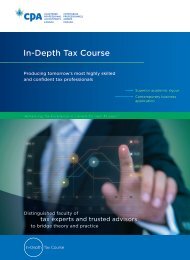20 Questions Directors and Audit Committees Should Ask about ...
20 Questions Directors and Audit Committees Should Ask about ...
20 Questions Directors and Audit Committees Should Ask about ...
You also want an ePaper? Increase the reach of your titles
YUMPU automatically turns print PDFs into web optimized ePapers that Google loves.
<strong>20</strong> <strong>Questions</strong><br />
<strong>Directors</strong> <strong>and</strong> <strong>Audit</strong> <strong>Committees</strong><br />
<strong>Should</strong> <strong>Ask</strong> <strong>about</strong><br />
IFRS Conversions<br />
Revised<br />
Written by<br />
Rafik Greiss, FCA, CPA (Illinois)<br />
Simon Sharp, CA<br />
<strong>20</strong> questions
How to use this<br />
publication<br />
Each “<strong>20</strong> <strong>Questions</strong>” briefing is designed to be<br />
a concise, easy-to-read introduction to an issue<br />
of importance to directors. The question format<br />
reflects the oversight role of directors which<br />
includes asking management — <strong>and</strong> themselves<br />
— tough questions.<br />
In some cases, boards <strong>and</strong> audit committees may<br />
not want to ask the questions directly <strong>and</strong> prefer<br />
to ask the Chief <strong>Audit</strong> Executive or management<br />
to include the topics or answers to the questions<br />
in the annual audit plan or other presentations to<br />
the Committee. The questions are not intended to<br />
be a precise checklist, but rather a way to provide<br />
insight <strong>and</strong> stimulate discussion on important<br />
topics.<br />
The comments that accompany the questions<br />
provide directors with a basis for critically<br />
assessing the answers they get <strong>and</strong> digging<br />
deeper as necessary. The comments summarize<br />
current thinking on the issues <strong>and</strong> the practices<br />
of leading organizations. Although the questions<br />
apply to most medium to large organizations,<br />
the answers will vary according to the size,<br />
complexity <strong>and</strong> sophistication of each individual<br />
organization.<br />
Written by<br />
Rafik Greiss, FCA, CPA (Illinois)<br />
Canadian IFRS Leader, Ernst & Young<br />
Simon Sharp, CA<br />
Senior Manager, Ernst & Young<br />
Project direction<br />
Gigi Dawe<br />
Principal, Risk Management <strong>and</strong> Governance<br />
CICA<br />
The CICA has granted permission<br />
to the ICD to use these materials<br />
in its Director Education Program.
<strong>20</strong> <strong>Questions</strong><br />
<strong>Directors</strong> <strong>and</strong> <strong>Audit</strong> <strong>Committees</strong><br />
<strong>Should</strong> <strong>Ask</strong> <strong>about</strong><br />
IFRS Conversions<br />
Revised
Library <strong>and</strong> Archives Canada Cataloguing in Publication<br />
Greiss, Rafik (date)<br />
<strong>20</strong> questions directors <strong>and</strong> audit committees should ask <strong>about</strong> IFRS conversions<br />
revision/ Rafik Greiss, Simon Sharp.<br />
ISBN 978-1-55385-325-1<br />
1. Financial statements — St<strong>and</strong>ards — Canada. 2. Accounting — St<strong>and</strong>ards<br />
— Canada. I. Sharp, Simon, 1965- II. Canadian Institute of Chartered Accountants III.<br />
Title. IV. Title: Twenty questions directors <strong>and</strong> audit committees should ask <strong>about</strong><br />
IFRS conversions.<br />
HF5626.G74 <strong>20</strong>08 657 3021871 C<strong>20</strong>08-900404-3<br />
Copyright © <strong>20</strong>10<br />
Canadian Institute of Chartered Accountants<br />
277 Wellington Street West<br />
Toronto, ON M5V 3H2<br />
Printed in Canada<br />
Disponible en français<br />
June <strong>20</strong>10
<strong>20</strong> <strong>Questions</strong> <strong>Directors</strong> <strong>and</strong> <strong>Audit</strong> <strong>Committees</strong> <strong>Should</strong> <strong>Ask</strong> <strong>about</strong> IFRS Conversions<br />
Table of Contents<br />
Preface<br />
Introduction<br />
Background<br />
Conversion project<br />
considerations<br />
1. What will converting to IFRS mean for our<br />
business?<br />
2. How do we plan to approach the conversion<br />
to IFRS?<br />
3. What are the key areas that need to be<br />
addressed during the conversion?<br />
4. What is the timeline for our IFRS conversion<br />
project, what resources will be required <strong>and</strong><br />
how much will it cost?<br />
5. What can we learn from the European Union<br />
conversion experience?<br />
Financial reporting<br />
considerations<br />
6. How will converting to IFRS impact external<br />
financial reporting in our organization?<br />
7. What will be the impact on management<br />
reporting?<br />
8. How will management address the need for<br />
<strong>20</strong>10 financial information prepared under<br />
both Canadian GAAP <strong>and</strong> IFRS?<br />
9. What are our competitors <strong>and</strong> industry peers<br />
doing?<br />
10. Will publicly accountable enterprises be<br />
required to apply IFRS throughout their group<br />
structures?<br />
11. How will IFRS impact tax reporting <strong>and</strong> tax<br />
filings?<br />
Non-financial reporting<br />
considerations<br />
12. Other than financial reporting, which other<br />
business areas will be impacted by the<br />
conversion?<br />
13. Can our current IT systems h<strong>and</strong>le the<br />
business’ revised data collection requirements<br />
under IFRS?<br />
14. What IFRS training programs are management<br />
planning to provide to finance personnel?<br />
Other board considerations<br />
15. What are the most significant risks associated<br />
with converting to IFRS?<br />
16. What are the other key risks associated with<br />
converting to IFRS?<br />
17. How can our organization take advantage of<br />
the opportunities presented by the conversion<br />
to IFRS?<br />
18. How will converting to IFRS impact our<br />
stakeholders, <strong>and</strong> what should be done to<br />
manage the expectations of capital markets?<br />
19. What should the role of our auditor be in the<br />
conversion process, <strong>and</strong> do we need a third<br />
party advisor independent from our auditor?<br />
<strong>20</strong>. Other than financial reporting integrity, what<br />
are the other implications for boards of<br />
directors?<br />
Where to find more information<br />
1
Preface<br />
The Risk Oversight <strong>and</strong> Governance Board of<br />
the Canadian Institute of Chartered Accountants<br />
commissioned this document to help boards of<br />
directors, <strong>and</strong> particularly audit committees, to<br />
fulfill their oversight responsibilities relating to the<br />
conversion to International Financial Reporting<br />
St<strong>and</strong>ards (IFRS).<br />
Risk OVERSIGHT <strong>and</strong><br />
Governance Board<br />
Brian Ferguson, FCA, Chair<br />
Bryan Held, FCA, ICD.D<br />
Andrew J. MacDougall, LL.B.<br />
Michael B. Meagher, FCA<br />
Anne Marie O’Donovan, FCA<br />
Sue Payne, FCA, C.Dir<br />
Peter Roberts, FCA<br />
Debi Rosati, FCA, ICD.D<br />
Catherine Smith, ICD.D<br />
<strong>Directors</strong> Advisory Group<br />
Giles Meikle, FCA, Chair<br />
John Caldwell, CA<br />
William Dimma, F.ICD, ICD.D<br />
John Ferguson, FCA<br />
Gordon Hall, FSA, ICD.D<br />
Carol Hansell LL.B<br />
Ronald Osborne, FCA<br />
Tom Peddie, FCA<br />
Guylaine Saucier, CM, FCA, F.ICD<br />
Hap Stephen, CA<br />
Peter Stephenson, PhD, ICD.D<br />
CICA Staff<br />
Ian Hague, CA<br />
Director, Guidance <strong>and</strong> Support<br />
Gigi Dawe<br />
Principal, Risk Management <strong>and</strong> Governance<br />
Beth Deazeley, LL.B.<br />
Principal, Risk Management <strong>and</strong> Governance<br />
Although the Canadian transition to IFRS will<br />
occur in <strong>20</strong>11, boards of directors need to begin<br />
now to address the implications of the conversion<br />
for their organization. This involves consideration<br />
not only of the conversion process itself, but<br />
of issues relating to risk, stakeholder relations,<br />
financial reporting, <strong>and</strong> internal controls which<br />
will be triggered by the transition.<br />
In preparing for the conversion, Canadian<br />
companies have the benefit of the experience of<br />
companies in the European Union who converted<br />
to IFRS in <strong>20</strong>05.<br />
It will be crucial for all directors to have a general<br />
underst<strong>and</strong>ing of what the transition to IFRS<br />
will mean for their organization. Members of<br />
audit <strong>and</strong> other board committees will require a<br />
greater level of detail. While the level of detail in<br />
this document may be more directly relevant to<br />
members of audit committees, it will also provide<br />
a solid foundation for all board members.<br />
This document provides suggested questions for<br />
boards to ask themselves, senior management<br />
<strong>and</strong> others. For each question, there is a brief<br />
explanatory background <strong>and</strong> some suggestions.<br />
Both the process <strong>and</strong> the implications of<br />
the conversion to IFRS will vary widely among<br />
Canadian companies, <strong>and</strong> no list of questions can<br />
be universally applicable. <strong>Directors</strong> must use their<br />
own judgment to determine if there is additional<br />
information that they need, but these questions<br />
are designed to focus thought <strong>and</strong> discussion on<br />
the issue.<br />
The Risk Oversight <strong>and</strong> Governance Board<br />
acknowledges <strong>and</strong> thanks the members of the<br />
<strong>Directors</strong> Advisory Group for their invaluable<br />
advice, the authors Rafik Greiss <strong>and</strong> Simon Sharp<br />
of Ernst & Young LLP, <strong>and</strong> the CICA staff who<br />
provided support to the project.<br />
Brian Ferguson, FCA<br />
Chair, Risk Oversight <strong>and</strong> Governance Board<br />
2
<strong>20</strong> <strong>Questions</strong> <strong>Directors</strong> <strong>and</strong> <strong>Audit</strong> <strong>Committees</strong> <strong>Should</strong> <strong>Ask</strong> <strong>about</strong> IFRS Conversions<br />
Introduction<br />
In <strong>20</strong>11, the accounting framework under which<br />
financial statements in Canada are prepared<br />
for all publicly accountable enterprises (PAEs)<br />
will change to International Financial Reporting<br />
St<strong>and</strong>ards (IFRS). Generally accepted accounting<br />
principles (GAAP) in Canada, as we currently<br />
know them, will cease to apply for this group of<br />
entities <strong>and</strong> will be replaced by IFRS. In practice,<br />
references to Canadian GAAP will remain in<br />
regulatory <strong>and</strong> legal contexts. IFRS will be incorporated<br />
into the Canadian GAAP h<strong>and</strong>book.<br />
The Canadian Securities Administrators (CSA)<br />
Corporate Governance Guidelines state that, as<br />
part of their stewardship role, boards of directors<br />
are responsible for “the identification of the principal<br />
risks of the issuers’ business <strong>and</strong> ensuring the<br />
implementation of appropriate systems to manage<br />
these risks.” In addition, the Guidelines state that<br />
boards are responsible for the “issuers’ internal<br />
control <strong>and</strong> management information systems.” 1<br />
The responsibility for executing the conversion<br />
to IFRS will rest with management. It will be the<br />
board’s responsibility to play an oversight role <strong>and</strong><br />
ensure that management has discharged its responsibilities<br />
<strong>and</strong> executed an effective conversion.<br />
Converting to IFRS will be one of the most<br />
fundamental changes that PAEs will have to deal<br />
with over the next few years. Such a momentous<br />
change will bring with it both significant risks <strong>and</strong><br />
opportunities, <strong>and</strong> boards need to be prepared<br />
for the change if they are to adequately fulfill their<br />
function in this area <strong>and</strong> discharge their overall<br />
stewardship responsibilities.<br />
The questions in this document are designed to help<br />
directors, <strong>and</strong> audit committee members in particular,<br />
underst<strong>and</strong> the potential scope of the change management<br />
exercise that the conversion may present to<br />
their business. They will also provide guidance to the<br />
board of directors <strong>and</strong> the members of its particular<br />
committees on what questions they should be asking<br />
management as they prepare for the conversion.<br />
The questions are organized into four main groups:<br />
1. Conversion project considerations<br />
2. Financial reporting considerations<br />
3. Non-financial reporting considerations<br />
4. Other board considerations<br />
The level of detail provided in the answers has<br />
been set deliberately to allow directors to better<br />
underst<strong>and</strong> the issues management will face<br />
during a conversion <strong>and</strong> thereby better prepare<br />
boards to fulfill their oversight role throughout<br />
the conversion period.<br />
What constitutes a publicly accountable<br />
enterprise?<br />
The Preface to the CICA H<strong>and</strong>book defines a<br />
publicly accountable enterprise as<br />
“an entity, other than a not-for-profit organization,<br />
or a government or other entity in<br />
the public sector, that:<br />
(i) has issued, or is in the process of<br />
issuing, debt or equity instruments that<br />
are, or will be, outst<strong>and</strong>ing <strong>and</strong> traded in<br />
a public market (a domestic or foreign<br />
stock exchange or an over-the-counter<br />
market, including local <strong>and</strong> regional<br />
markets); or<br />
(ii) holds assets in a fiduciary capacity for<br />
a broad group of outsiders as one of its<br />
primary businesses.<br />
Banks, credit unions, insurance companies,<br />
securities brokers/dealers, mutual funds<br />
<strong>and</strong> investment banks typically meet the<br />
second criterion above. Other entities may<br />
also hold assets in a fiduciary capacity for a<br />
broad group of outsiders because they hold<br />
<strong>and</strong> manage financial resources entrusted<br />
to them by clients, customers or members<br />
not involved in the management of the<br />
entity. However, if they do so for reasons<br />
incidental to a primary business (as, for<br />
example, may be the case for travel or real<br />
estate agents, co-operative enterprises<br />
requiring a nominal membership deposit, or<br />
sellers that receive payment in advance of<br />
delivery of the goods or services, such as<br />
utility companies), that does not make them<br />
publicly accountable.”<br />
This definition does not preclude other<br />
entities from also adopting IFRSs. It is a<br />
“principle-based” definition that requires<br />
entities to consider for themselves whether<br />
they fit within it.<br />
The Public Sector Accounting Board requires that<br />
Government Business Enterprises adopt IFRSs.<br />
1<br />
CSA Corporate Governance Guidelines NP 58-<strong>20</strong>1 p. 3.4<br />
3
Glossary of terms<br />
AcSB<br />
CFO<br />
CICA<br />
CSA<br />
EU<br />
FASB<br />
FPI<br />
GAAP<br />
IAS<br />
IASB<br />
IASC<br />
IFRS<br />
IT<br />
ITA<br />
PE<br />
NPO<br />
Non-Public Group<br />
PAE<br />
Public Group<br />
SEC<br />
Accounting St<strong>and</strong>ards Board of Canada<br />
Chief financial officer<br />
Canadian Institute of Chartered Accountants<br />
Canadian Securities Administrators<br />
european Union<br />
Financial Accounting St<strong>and</strong>ards Board<br />
Foreign private issuers<br />
Generally accepted accounting principles<br />
International Accounting St<strong>and</strong>ards<br />
International Accounting St<strong>and</strong>ards Board<br />
International Accounting St<strong>and</strong>ards Committee<br />
International Financial Reporting St<strong>and</strong>ards<br />
Information technology<br />
Income Tax Act of Canada<br />
Private enterprise<br />
Not-for-profit organization<br />
Group containing only PEs<br />
Publicly accountable enterprise<br />
Group containing at least one PAE<br />
Securities Exchange Commission<br />
4
<strong>20</strong> <strong>Questions</strong> <strong>Directors</strong> <strong>and</strong> <strong>Audit</strong> <strong>Committees</strong> <strong>Should</strong> <strong>Ask</strong> <strong>about</strong> IFRS Conversions<br />
Background<br />
Origins of IFRS<br />
A single set of global accounting st<strong>and</strong>ards has<br />
been under development for over three decades<br />
since the International Accounting St<strong>and</strong>ards<br />
Committee (“IASC”) was first established in<br />
1973. Today, this suite of st<strong>and</strong>ards comprises<br />
International Accounting St<strong>and</strong>ards (“IASs”)<br />
first issued by the IASC <strong>and</strong>, subsequent to<br />
April <strong>20</strong>01, IFRS issued by the IASC’s successor,<br />
the International Accounting St<strong>and</strong>ards Board<br />
(“IASB”), as well as interpretations of those<br />
st<strong>and</strong>ards.<br />
The IASB’s mission includes the development of<br />
“a single set of high quality, underst<strong>and</strong>able <strong>and</strong><br />
enforceable global accounting st<strong>and</strong>ards that<br />
require transparent <strong>and</strong> comparable information<br />
in financial statements <strong>and</strong> other financial<br />
reporting….” The IASB seeks to “bring <strong>about</strong><br />
convergence of national accounting st<strong>and</strong>ards<br />
<strong>and</strong> International Accounting St<strong>and</strong>ards <strong>and</strong><br />
International Financial Reporting St<strong>and</strong>ards to<br />
high quality solutions.” 2<br />
It wasn’t until <strong>20</strong>05, with the advent of the<br />
European Commission’s requirement for public<br />
companies reporting within the European Union<br />
(“EU”) to prepare consolidated financial statements<br />
compliant with IFRS, that IFRS began to<br />
be widely applied around the world, <strong>and</strong> the<br />
IASB could be said to have moved significantly to<br />
achieving its goal. Australian <strong>and</strong> other st<strong>and</strong>ard<br />
setters soon followed the EU <strong>and</strong> today over 100<br />
countries either require or permit the use of IFRS<br />
for public company reporting.<br />
2<br />
IASCF Foundation Constitution, 1 February <strong>20</strong>09<br />
IFRS in Canada<br />
Early in <strong>20</strong>06, the Accounting St<strong>and</strong>ards Board<br />
(“AcSB”) released its strategic plan for carrying out<br />
its st<strong>and</strong>ard-setting m<strong>and</strong>ate in Canada 3 . The plan<br />
recognizes that accounting st<strong>and</strong>ards for public<br />
companies may not be suitable for other organizations,<br />
<strong>and</strong> the AcSB foresees the need for separate<br />
strategies dealing with different categories of<br />
reporting entity. Under the plan, Canadian GAAP for<br />
PAEs will converge with IFRS over a transitional<br />
period. This transition period extends to <strong>20</strong>11,<br />
with the first financial reports of PAEs required to<br />
comply with IFRS being for accounting periods<br />
commencing on or after January 1, <strong>20</strong>11. The AcSB<br />
has also issued new accounting st<strong>and</strong>ards for<br />
Private Enterprises (“PEs”), but has yet to finalize its<br />
proposals for not-for-profit organizations (“NPOs”).<br />
IFRSs continue to change. It is expected that there<br />
will be no significant new IFRSs m<strong>and</strong>atory for <strong>20</strong>11<br />
calendar years, but several significant changes are<br />
expected in <strong>20</strong>12 <strong>and</strong> subsequently. In some cases,<br />
these changes will be available for early adoption.<br />
Consideration will need to be given to when a particular<br />
entity decides to adopt such changes. The<br />
AcSB staff publishes a summary of which IFRSs<br />
are expected to apply for Canadian changeover in<br />
<strong>20</strong>11, available from the AcSB web site. 4<br />
Rationale for conversion<br />
The AcSB’s rationale for conversion to IFRS centres<br />
on the anticipated benefits to Canadian companies<br />
of reporting using a single global set of accounting<br />
st<strong>and</strong>ards. Some believe that the increased<br />
comparability of financial statements arising<br />
from applying IFRS will improve accessibility to<br />
global capital markets, possibly reduce Canadian<br />
companies’ cost of capital <strong>and</strong> thereby improve<br />
their global competitiveness. When considering the<br />
alternative option of U.S. GAAP, the AcSB cites the<br />
following influences on its decision:<br />
1. A lower cost of compliance is expected with a<br />
principles-based accounting framework such<br />
as IFRS than with the more detailed U.S. GAAP<br />
system.<br />
2. The joint partnership between the IASB <strong>and</strong><br />
FASB means that, over time, the differences<br />
between IFRS <strong>and</strong> U.S. GAAP will diminish as<br />
joint st<strong>and</strong>ards are issued.<br />
3<br />
Accounting St<strong>and</strong>ards in Canada: New Directions, published<br />
by the AcSB at http://www.acsbcanada.org<br />
4<br />
http://www.acsbcanada.org/international-activities/<br />
item33131.pdf.<br />
5
Conversion timeline<br />
When one considers the practicalities of the AcSB’s<br />
conversion timeline, it becomes clear that there<br />
is not as much time as one might first expect to<br />
complete the transition to IFRS. Figure 1 outlines<br />
the expected timeline for PAE “Example Ltd.”<br />
converting to IFRS. Example Ltd. has a fiscal year<br />
end of December 31. The first set of annual IFRS<br />
financial statements for Example Ltd. will be for the<br />
year ending December 31, <strong>20</strong>11. These financials<br />
will need to include comparative information also<br />
compiled under IFRS for the year ending December<br />
31, <strong>20</strong>10. In order to determine the profit <strong>and</strong> loss<br />
result <strong>and</strong> cash flows for <strong>20</strong>10, management will<br />
also need to restate Example Ltd.’s opening balance<br />
sheet from Canadian GAAP to IFRS. This date,<br />
January 1, <strong>20</strong>10, is known as Example Ltd.’s “transition<br />
date” as this is the earliest date the company is<br />
required to prepare IFRS information. Further, as a<br />
public company, Example Ltd. must submit quarterly<br />
accounts under IFRS commencing with the<br />
quarter ending March 31, <strong>20</strong>11. These too will need<br />
IFRS comparatives. Hence, the first IFRS filing will<br />
be Quarter 1, <strong>20</strong>11. One must also remember that<br />
Example Ltd. will still be required to report under<br />
existing Canadian GAAP for <strong>20</strong>10.<br />
This means that companies have little time<br />
remaining to underst<strong>and</strong> the impacts of converting<br />
to IFRS, conduct appropriate planning<br />
activities, decide on a conversion approach, select<br />
revised IFRS-compliant accounting policies, train<br />
personnel, <strong>and</strong> test <strong>and</strong> roll out implementation<br />
strategies. This is in addition to running their dayto-day<br />
operations <strong>and</strong> addressing the compliance<br />
issues arising from the AcSB’s convergence<br />
activities during the transition period. 5<br />
In order to keep investors <strong>and</strong> other stakeholders<br />
informed <strong>about</strong> the coming change in financial<br />
reporting, the CSA has issued requirements for<br />
entities to include disclosure of their progress<br />
toward IFRS conversion in their <strong>20</strong>08. <strong>20</strong>09 <strong>and</strong><br />
<strong>20</strong>10 management discussion <strong>and</strong> analysis. 6<br />
5<br />
The AcSB has issued amendments to existing Canadian GAAP,<br />
applicable in <strong>20</strong>10. In the main, these amendments relate to accounting<br />
for financial instruments <strong>and</strong> disclosure of related risks.<br />
6<br />
CSA Staff Notice 52-3<strong>20</strong> Disclosure of Expected Changes in<br />
Accounting Policies Relating to Changeover to International<br />
Financial Reporting St<strong>and</strong>ards.<br />
Figure 1. IFRS Conversion Timeline<br />
Preparing for Q1 <strong>20</strong>11 IFRS filing requirements<br />
Fiscal <strong>20</strong>10<br />
Q1 Q2 Q3<br />
Q4<br />
Q1 <strong>20</strong>11 filing requirements<br />
Opening external IFRS SFP<br />
File Canadian GAAP financial statements<br />
Prepare opening internal IFRS statement<br />
of financial position (SFP) <strong>and</strong> <strong>20</strong>10 IFRS<br />
interim financial statements<br />
Annual IFRS equity reconciliations<br />
Annual IFRS comprehensive<br />
income reconciliations<br />
Interim IFRS comprehensive<br />
income reconciliations<br />
Interim IFRS equity reconciliations<br />
Prepare IFRS annual <strong>and</strong> interim reconciliations<br />
<strong>and</strong> note disclosures<br />
Interim IFRS financial statements<br />
(IAS 34 compliant)<br />
Involve auditor with opening internal IFRS SFP<br />
<strong>and</strong> <strong>20</strong>10 IFRS interim financial statements<br />
Interim IFRS note disclosure<br />
(IAS 34 compliant) including<br />
explanations of material items from<br />
the IFRS <strong>20</strong>10 annual period<br />
6
<strong>20</strong> <strong>Questions</strong> <strong>Directors</strong> <strong>and</strong> <strong>Audit</strong> <strong>Committees</strong> <strong>Should</strong> <strong>Ask</strong> <strong>about</strong> IFRS Conversions<br />
Conversion Project<br />
Considerations<br />
1. What will converting to IFRS mean for<br />
our business?<br />
IFRS adoption will result in major change for<br />
business. The change driven by IFRS will not be<br />
restricted to the finance function. Converting to<br />
IFRS will not merely be a technical accounting<br />
exercise but more a widespread change management<br />
exercise that will impact many areas of<br />
the business. Any business function required<br />
to prepare financial information, or impacted by<br />
financial information, has the potential for change.<br />
Given the expected change in earnings <strong>and</strong><br />
financial position, one should expect changes to:<br />
• executive <strong>and</strong> employee evaluation <strong>and</strong><br />
compensation plans (Human Resources),<br />
• foreign exchange <strong>and</strong> hedging activities<br />
(Treasury),<br />
• corporate income taxes (Taxation),<br />
• ratios <strong>and</strong> bank covenants (Finance <strong>and</strong><br />
Treasury),<br />
• internal controls <strong>and</strong> processes (Finance),<br />
• investor relations <strong>and</strong> communication to capital<br />
markets (Finance <strong>and</strong> Investor Relations),<br />
• management reporting (Finance), <strong>and</strong><br />
• IT <strong>and</strong> data systems (IT).<br />
As one can see from the potential changes,<br />
various committees of the board of directors, in<br />
addition to the audit committee, will have a vested<br />
interest in the conversion to IFRS, including<br />
Human Resources, Executive Compensation <strong>and</strong><br />
Risk Management. Specifically, the CSA Corporate<br />
Governance Guidelines state that the board of<br />
directors should, as part of their overall stewardship<br />
responsibility, assume responsibility for:<br />
• the identification of the principal risks of the<br />
issuers’ business <strong>and</strong> ensuring the implementation<br />
of appropriate systems to manage<br />
these risks,<br />
• adopting a communication policy for the<br />
issuer, <strong>and</strong><br />
• the issuer’s internal control <strong>and</strong> management<br />
information systems. 7<br />
All this being said, it is important to note that<br />
each company’s concerns <strong>and</strong> the extent to which<br />
IFRS will impact them will be different. For some,<br />
the impacts will be pervasive; for others, they<br />
may be minimal.<br />
7<br />
CSA Corporate Governance Guidelines NP 58-<strong>20</strong>1 p. 3.4<br />
7
2. How do we plan to approach the<br />
conversion to IFRS?<br />
Converting to IFRS will entail a business-wide<br />
change management exercise <strong>and</strong> should be<br />
approached using a structured methodology<br />
encompassing the best practices of project<br />
management.<br />
Boards should pay close attention to the details<br />
of management’s proposed approach to the<br />
IFRS conversion <strong>and</strong> satisfy themselves that<br />
it covers all appropriate areas <strong>and</strong> is based on<br />
sound project management principles. Whereas<br />
management will be responsible for the conversion<br />
execution, boards need to be confident in<br />
management’s plan, thoroughness <strong>and</strong> diligence.<br />
Management should inform the board <strong>and</strong> the<br />
audit committee on a regular basis as to its plan<br />
<strong>and</strong> progress. As such, audit committees will<br />
generally include a st<strong>and</strong>ing IFRS agenda update<br />
item at their periodic meetings.<br />
Any GAAP conversion project should commence<br />
with some form of impact assessment, diagnostic<br />
activity or scoping exercise. This will allow<br />
management <strong>and</strong> boards of directors to visualize<br />
the extent <strong>and</strong> complexity of the conversion <strong>and</strong><br />
allow them to make better decisions <strong>about</strong> how<br />
to plan, structure <strong>and</strong> resource the project <strong>and</strong><br />
determine the next steps. Typically, the chief<br />
financial officer (“CFO”) would be the sponsor.<br />
The major outcomes management should expect<br />
from this phase are as follows:<br />
• The determination, at a high level, of the<br />
financial reporting differences (including the<br />
major GAAP differences) under IFRS, compared<br />
to the company’s current accounting<br />
policies.<br />
• The identification of the main business<br />
impacts expected from the adoption of IFRS.<br />
• An assessment, at a high level, of the likely<br />
impacts on IT systems <strong>and</strong> identification of<br />
the modifications necessary to facilitate collection<br />
of the information required to satisfy<br />
all IFRS disclosure requirements.<br />
• The identification of all major change management<br />
issues arising from the conversion.<br />
• The identification of any hurdles to conversion<br />
presented by the existing finance organizational<br />
structure.<br />
• The identification of any significant industry<br />
specific issues.<br />
• The provision of base information to facilitate<br />
the structuring of the IFRS conversion<br />
project.<br />
A sample methodology for conversion is shown in<br />
Figure 2 below. This is an example of one phased<br />
approach management may consider. Embedded<br />
within each phase are functionally based work<br />
streams. Each work stream contains specific<br />
areas to be considered as follows:<br />
• General accounting work stream — comprises<br />
all routine accounting activities, such as the<br />
development of IFRS accounting policies,<br />
drafting skeleton IFRS financial statements,<br />
updating IFRS reporting packages, management<br />
reporting, other local reporting requirements,<br />
<strong>and</strong> updating the group reporting<br />
manual.<br />
• Special accounting work stream — deals with<br />
the restatement from current Canadian GAAP<br />
to IFRS of specific, complex accounting areas.<br />
• Business management work stream — comprises<br />
all activities related to addressing<br />
<strong>and</strong> resolving the issues identified during<br />
the diagnostic phase that impact business<br />
functional areas outside of financial reporting.<br />
• Change management work stream<br />
— addresses the need for change in all areas<br />
of the business arising from the conversion.<br />
It will generally comprise the following main<br />
components: communication, training <strong>and</strong><br />
education, organization <strong>and</strong> human resources,<br />
<strong>and</strong> implementation support.<br />
• IT work stream — deals with issues such as<br />
the way IFRS may affect IT systems <strong>and</strong><br />
the resolution of any required changes to IT<br />
systems as a result of the conversion to IFRS.<br />
• Industry work stream — deals with restatement<br />
from current Canadian GAAP to IFRS in<br />
industry-specific areas.<br />
8
<strong>20</strong> <strong>Questions</strong> <strong>Directors</strong> <strong>and</strong> <strong>Audit</strong> <strong>Committees</strong> <strong>Should</strong> <strong>Ask</strong> <strong>about</strong> IFRS Conversions<br />
Figure 2. IFRS Conversion Roadmap<br />
Phases 1<br />
Diagnostic<br />
High level<br />
identification<br />
of current state<br />
Required outcomes of<br />
conversion identified<br />
Recommendation<br />
on how outcomes<br />
can be achieved<br />
Workstreams<br />
Heart of day-to-day<br />
work of the conversion<br />
project<br />
Represent principal<br />
working groups responsible<br />
for realizing<br />
the objectives for<br />
each of the “phases”<br />
Phases 2 – 5<br />
These phases will occur in all conversions<br />
Phases not necessarily discrete, sequential, nor of equal size or importance<br />
Phase 1 Phase 2 Phase 3 Phase 4 Phase 5<br />
Diagnostic<br />
Design<br />
<strong>and</strong><br />
Planning<br />
Solution<br />
Development<br />
Implementation<br />
General Accounting Workstream<br />
Special Accounting Workstream<br />
Business Management Workstream<br />
IT Workstream<br />
Change Management Workstream<br />
Industry Workstream<br />
Project Management<br />
Post<br />
Implementation<br />
Review<br />
3. What are the key areas that need to be<br />
addressed during the conversion?<br />
No two IFRS conversion projects will ever be<br />
the same — while the specific issues companies<br />
will face during their conversion will vary widely<br />
because of all the variables at play, the key areas<br />
management <strong>and</strong> boards will need to address<br />
during the conversion should be broadly similar.<br />
1. Project launch <strong>and</strong> planning activities<br />
Initial decisions made during the project<br />
set-up phase tend to be crucial to eventual<br />
project success. These include:<br />
a. creating a project management function<br />
to co-ordinate project activity <strong>and</strong> monitor/report<br />
progress,<br />
b. structuring the project team based on<br />
the results of the impact assessment<br />
phase — this helps to make sure that all<br />
potential issues get addressed,<br />
c. assigning sufficient resources to the project<br />
<strong>and</strong> ensuring that the team comprises<br />
individuals with appropriate skills <strong>and</strong><br />
background to fulfill their responsibilities.<br />
2. Revision of accounting policies<br />
Reassessing accounting policies under IFRS<br />
will be one of the most important elements<br />
of the project because the decisions made<br />
in this area will drive many of the changes<br />
required throughout the business <strong>and</strong> have<br />
direct implications for future business results.<br />
For instance, accounting policy decisions will<br />
impact data collection requirements, which, in<br />
turn, will impact IT system requirements, business<br />
processes to collect <strong>and</strong> record the data,<br />
internal control systems covering data validity,<br />
<strong>and</strong> functional resourcing requirements. <strong>Audit</strong><br />
committees will need to review <strong>and</strong> be comfortable<br />
with the policies selected by management.<br />
3. Application of IFRS 1<br />
Another key area management will need to<br />
address in relation to accounting policies is<br />
how they are going to apply IFRS 1, “Firsttime<br />
Adoption of International Financial<br />
Reporting St<strong>and</strong>ards.” This st<strong>and</strong>ard provides<br />
guidance for businesses on how they should<br />
apply IFRS for the first time <strong>and</strong> provides<br />
companies with a number of exemptions<br />
from the requirements of other st<strong>and</strong>ards.<br />
Decisions made in applying IFRS 1 could have<br />
a significant impact on the financial statements<br />
for many years to come.<br />
9
4. Development of skeleton financial statements<br />
compliant with IFRS<br />
Companies will have to redraft sections<br />
of their financial statements to meet IFRS<br />
disclosure requirements. Management may<br />
take the approach of preparing a skeleton set<br />
of financial statements during the preliminary<br />
phases of the project. This has multiple<br />
benefits as it focuses attention on the actual<br />
disclosure requirements of the business <strong>and</strong><br />
therefore is crucial in the process of identifying<br />
“data gaps” that need to be plugged. It is<br />
also useful to put the overall change management<br />
challenge in perspective <strong>and</strong> gives<br />
project teams a concrete goal.<br />
5. Preparation/restatement of financial information<br />
from current Canadian GAAP to IFRS<br />
for all comparative accounting periods<br />
The need to compile comparative financial<br />
information for inclusion in the first set of<br />
IFRS accounts is likely to prove to be one of<br />
the most challenging areas of the project. The<br />
board, through its audit committee, needs<br />
to satisfy itself that careful consideration is<br />
given to the approach adopted by management<br />
to compile this information.<br />
6. Transition approach<br />
Whereas some companies globally converted<br />
“top-side” only at a consolidated level,<br />
this spreadsheet approach is not ideal.<br />
Accounting treatments <strong>and</strong> controls should<br />
be pushed down to the transaction level.<br />
This is particularly important in Canada given<br />
management’s internal control certification<br />
requirements (SOX 404 or NI-52-109). The<br />
audit committee will need to carefully consider<br />
which transition approach is appropriate<br />
for their business.<br />
7. Identifying <strong>and</strong> resolving data capture issues<br />
The increased level <strong>and</strong> complexity of the<br />
financial disclosures expected under IFRS are<br />
likely to require significant project resources<br />
to identify <strong>and</strong> set up processes to collate this<br />
data. Some of the data underlying the new<br />
disclosures may be time-consuming to extract<br />
or may need significant analysis before it is<br />
ready for disclosure purposes. Boards need to<br />
be satisfied that management’s plans include<br />
adequate mechanisms to identify <strong>and</strong> resolve<br />
data gaps.<br />
8. Retraining of personnel<br />
Boards need to be satisfied that adequate<br />
investment is being made in the retraining<br />
of employees throughout the organization<br />
in order to meet their changed technical<br />
knowledge needs as well as to facilitate the<br />
roll-out of accounting policy changes <strong>and</strong> the<br />
associated revised business processes <strong>and</strong><br />
procedures.<br />
9. Communication with stakeholders<br />
Managing investors’ <strong>and</strong> other stakeholders’<br />
expectations with respect to the impacts of<br />
IFRS <strong>and</strong> the company’s progress toward<br />
conversion will be an important area for<br />
boards to monitor. Clear, continuous <strong>and</strong><br />
consistent communication with stakeholders<br />
will reduce the risk of misunderst<strong>and</strong>ings <strong>and</strong><br />
aid a smooth transition.<br />
10. <strong>Audit</strong> committee financial literacy<br />
<strong>and</strong> retraining<br />
The training requirements will also apply to<br />
members of the audit committee. Whether<br />
trained through management briefings or by<br />
outside parties, audit committee members<br />
should have sufficient knowledge <strong>about</strong> IFRS<br />
to be able to evaluate management’s assessments<br />
<strong>and</strong> selection of accounting policies.<br />
This is elaborated upon in Question <strong>20</strong>.<br />
10
<strong>20</strong> <strong>Questions</strong> <strong>Directors</strong> <strong>and</strong> <strong>Audit</strong> <strong>Committees</strong> <strong>Should</strong> <strong>Ask</strong> <strong>about</strong> IFRS Conversions<br />
4. What is the timeline for our IFRS<br />
conversion project, what resources will<br />
be required <strong>and</strong> how much will it cost?<br />
The main consideration regarding the timeline will<br />
be “will the organization be ready on time?”<br />
By performing an impact assessment exercise<br />
<strong>and</strong> conducting careful planning at the beginning<br />
of the project, it should be possible to determine<br />
the major areas relevant to the business <strong>and</strong><br />
from there construct reasonable estimates of<br />
the resources required, the time to complete the<br />
project <strong>and</strong> thus the costs <strong>and</strong> resources involved.<br />
Few meaningful benchmarks exist regarding<br />
effort <strong>and</strong> cost, as the impact of changes in<br />
accounting principles on functional areas <strong>and</strong><br />
related processes varies significantly amongst<br />
companies <strong>and</strong> within industries, depending on<br />
pre-existing business or accounting processes.<br />
The size <strong>and</strong> complexity of accounting conversion<br />
projects mean that there are so many variables<br />
impacting the timeline <strong>and</strong> cost considerations<br />
that concrete assessments are not possible<br />
without an appropriate diagnostic <strong>and</strong> project<br />
plan. Also, as with any sizable project, there will<br />
be shortcuts that can be taken, workarounds<br />
available <strong>and</strong> elements that can be side-stepped<br />
or ignored. However, these may lead to hidden<br />
costs, which should be taken into account when<br />
estimating budgets.<br />
It follows then that until management completes<br />
the impact assessment <strong>and</strong> planning activities, it<br />
is difficult to determine if the business has sufficient<br />
time to adequately complete the conversion.<br />
For this reason, the best advice regarding<br />
the timing of the conversion project is to start as<br />
early as possible if not already started.<br />
11
5. What can we learn from the European<br />
Union conversion experience?<br />
Canadian business has the benefit of the experience<br />
of countries that have already converted to<br />
IFRS. Below are some of the issues encountered<br />
<strong>and</strong> the key lessons one can learn from their<br />
experiences.<br />
Issues identified<br />
Scale <strong>and</strong> complexity of the project <strong>and</strong> the time<br />
frame needed were underestimated.<br />
Project lacked adequate buy-in from senior<br />
management early on in the project.<br />
Projects suffered from poor project<br />
management.<br />
Project teams were unprepared to deal with the<br />
technical issues encountered.<br />
Slight accounting differences can have<br />
a significant impact on financial results.<br />
Unfamiliarity of “numbers” <strong>and</strong> principles arising<br />
from changes.<br />
Poor communication existed between project<br />
team <strong>and</strong> business units regarding impacts<br />
of changes.<br />
IFRS changes were often not fully embedded<br />
in back offices <strong>and</strong> general ledger systems.<br />
As a result, “st<strong>and</strong> alone manual workarounds”<br />
were created, including “spreadsheet accounting.”<br />
Top side solutions didn’t work.<br />
Insufficient communication with stakeholders.<br />
Key lessons learned<br />
Start as quickly as possible, if not already started!<br />
Conducting a thorough impact assessment<br />
followed by a detailed planning exercise up front<br />
is crucial to a successful transition. Conversions<br />
could entail functional changes as well as technical<br />
accounting changes.<br />
The “tone from the top” is an important driver of<br />
change. Board sponsorship of the project is crucial.<br />
The importance of having a proper Project<br />
Management Office function capable of co-ordinating<br />
project activities <strong>and</strong> a well-structured<br />
conversion methodology.<br />
Developing IFRS technical knowledge early on<br />
will prevent last minute “fire drills” <strong>and</strong> minimize<br />
the risk of missed reporting deadlines.<br />
A methodical approach to reviewing accounting differences<br />
is essential to assessing financial impacts.<br />
Technical training will be a critical component of<br />
the IFRS conversion, especially for business unit<br />
heads who may not be familiar with the implications<br />
of the changes that IFRS will bring. Investor<br />
relations will also need a strong educational<br />
grounding to communicate the impact to investors.<br />
Invest the time necessary to roll-out business<br />
process changes such as accounting practices,<br />
updated control mechanisms, changes in reporting<br />
requirements to the wider organization.<br />
EU companies that used manual workarounds to<br />
meet short IFRS deadlines subsequently need to<br />
redesign processes <strong>and</strong> augment their systems<br />
to eliminate the inefficiencies these workarounds<br />
created. Canadian firms will benefit from longer<br />
lead times to proactively address these changes.<br />
Top side solutions don’t cause the organization<br />
to adjust, <strong>and</strong> the Finance group feels “all the<br />
pain.” It is important to “push down” the IFRS<br />
conversion to the transaction level throughout<br />
the organization as early as possible.<br />
Capital markets are reactive <strong>and</strong> companies<br />
should more proactively manage investor<br />
communications <strong>and</strong> perceptions.<br />
12
<strong>20</strong> <strong>Questions</strong> <strong>Directors</strong> <strong>and</strong> <strong>Audit</strong> <strong>Committees</strong> <strong>Should</strong> <strong>Ask</strong> <strong>about</strong> IFRS Conversions<br />
Financial Reporting<br />
Considerations<br />
6. How will converting to IFRS impact<br />
external financial reporting in our<br />
organization?<br />
Converting to IFRS will have far-reaching effects<br />
on the way financial reporting is conducted.<br />
Some of the key impacts include:<br />
1. Transitional impact on bottom line<br />
While the conceptual frameworks upon<br />
which current Canadian GAAP <strong>and</strong> IFRS<br />
are formulated are both principles based<br />
<strong>and</strong> are generally considered to be broadly<br />
similar, there will remain at the conversion<br />
date a number of significant differences <strong>and</strong><br />
numerous minor differences between the two<br />
sets of st<strong>and</strong>ards that have the potential to<br />
create material impacts on reported results.<br />
Companies should expect a change in earnings<br />
<strong>and</strong> financial position. The expectation<br />
should also be that the “devil is in the detail.”<br />
<strong>Audit</strong> committees should review <strong>and</strong> be<br />
comfortable with the changes to the key<br />
accounting policies selected by management,<br />
including the sensitivity analysis that led to<br />
management’s decisions.<br />
2. Potential for increased volatility of reported<br />
results<br />
Adopting IFRS could result in increased volatility<br />
of reported financial results, depending<br />
on circumstances. IFRS provide for some<br />
optional uses of fair value measurements that<br />
are likely to have that effect, as both writeups<br />
<strong>and</strong> write-downs are reported.<br />
3. Increased volume <strong>and</strong> complexity of financial<br />
disclosures<br />
Reviews of the <strong>20</strong>05 financial statements of<br />
EU companies suggested financial disclosures<br />
under IFRS increased by upwards of 30% over<br />
prior national GAAP levels. Changes in level<br />
of disclosure in Canada are expected.<br />
4. Increased transparency <strong>and</strong> comparability<br />
Many users of financial statements in the<br />
EU reported finding IFRS accounts very<br />
clear <strong>and</strong> easy to underst<strong>and</strong> <strong>and</strong> many<br />
found them more useful than U.S. GAAP. As<br />
use of IFRS becomes more embedded <strong>and</strong><br />
experience in applying IFRS grows, increased<br />
transparency <strong>and</strong> comparability are benefits<br />
that should become more pronounced as the<br />
<strong>20</strong>11 deadline approaches. Improved levels of<br />
disclosure have been noted in the EU since<br />
<strong>20</strong>05. Canadian preparers will benefit from<br />
these advancements when comparing within<br />
their industries.<br />
The AcSB has assessed that <strong>about</strong> half<br />
of current Canadian accounting st<strong>and</strong>ards<br />
have “slight” differences compared to IFRS<br />
while the remainder have more than “slight”<br />
differences. 8 Conceivably, a “slight difference”<br />
could lead to a significant or material impact<br />
on financial results.<br />
7. What will be the impact on management<br />
reporting?<br />
IFRS will influence the way management runs<br />
the business <strong>and</strong> assesses performance. One of<br />
the significant trends reported in Europe was<br />
the increased use by management of “non-IFRS”<br />
measures (i.e., performance indicators not<br />
defined under IFRS) when communicating<br />
business performance to the market. 9<br />
The changes to accounting policies expected<br />
from applying IFRS <strong>and</strong> the need to record<br />
<strong>and</strong> classify information in specific ways to<br />
comply with the new st<strong>and</strong>ards may impact the<br />
financial information generated by the business.<br />
Management reporting formats <strong>and</strong> processes<br />
will need to be reviewed <strong>and</strong> updated accordingly.<br />
In addition, management will need to give<br />
some consideration to impacts on the key performance<br />
indicators used for measuring success<br />
<strong>and</strong> reviewing trends. There may also be impacts<br />
on the way budgeting <strong>and</strong> planning functions<br />
operate.<br />
8<br />
Summary Comparison of Canadian GAAP <strong>and</strong> IFRSs,<br />
July 31, <strong>20</strong>08, published by the AcSB<br />
9<br />
Observations on the Implementation of IFRS, published by<br />
Ernst & Young LLP, <strong>20</strong>06<br />
13
8. How will management address the need<br />
for <strong>20</strong>10 financial information prepared<br />
under both Canadian GAAP <strong>and</strong> IFRS?<br />
For companies with a December 31 year end, the<br />
transition date for applying IFRS is January 1, <strong>20</strong>10,<br />
as this is the opening balance sheet date for the<br />
first set of IFRS financial statements. Companies<br />
will need to restate their opening balance sheet<br />
<strong>and</strong> be in a position to report under both IFRS <strong>and</strong><br />
Canadian GAAP for the calendar year <strong>20</strong>10. How<br />
companies address this challenge will be one of<br />
the more significant issues they will face during the<br />
transition. The main options available to converters<br />
involve either dual GAAP accounting throughout<br />
the transition period or some form of restatement<br />
from Canadian GAAP to IFRS at each reporting date.<br />
Boards should pay special attention to the process<br />
management follows to arrive at a recommendation<br />
<strong>and</strong> be comfortable with the approach adopted.<br />
The decision will be based on a wide range of<br />
factors, including:<br />
• the estimated benefits in terms of time/cost,<br />
• the perceived risk of errors arising during the<br />
restatement process,<br />
• the ability of the present accounting system to<br />
h<strong>and</strong>le dual GAAP accounting (parallel runs) or<br />
the costs of upgrading to a system that does, <strong>and</strong><br />
• the implications for internal control<br />
certification.<br />
9. What are our competitors <strong>and</strong> industry<br />
peers doing?<br />
Companies often compare themselves to industry<br />
norms <strong>and</strong> peers, from both a strategic <strong>and</strong> a<br />
business focus as well as from a measurement <strong>and</strong><br />
results basis. Most companies will want to know<br />
what their peers are doing as it relates to IFRS <strong>and</strong>,<br />
specifically, the financial reporting decisions that<br />
are being made. Investors <strong>and</strong> market analysts will<br />
also want to be aware of the differences in decisions<br />
made by peer companies so they can take into<br />
account these differences when making decisions.<br />
In order to remain true <strong>and</strong> consistent with the<br />
IFRS objectives of comparability <strong>and</strong> transparency,<br />
management will need to assess the<br />
accounting principles selected by its industry<br />
peers. Although not all companies within the<br />
same industry will select identical policies,<br />
management’s analysis would not be complete<br />
without this peer assessment.<br />
10. Will publicly accountable enterprises be<br />
required to apply IFRS throughout their<br />
group structures?<br />
Converting to IFRS will mean that the classification<br />
of companies as PAEs or PEs will have implications<br />
for the form of financial reporting that they will be<br />
required to follow. PAEs will have to apply IFRS<br />
whereas PEs will have a choice between IFRS <strong>and</strong><br />
the accounting st<strong>and</strong>ards for PEs developed by<br />
the AcSB. However, transactions within a PAE<br />
group will need to be accounted for under IFRS for<br />
consolidated reporting purposes.<br />
This choice is available to all PEs, whether they are<br />
sole companies, part of a group comprising only PEs<br />
(“Non-Public Group”), or a part of a group containing<br />
a mixture of PAEs <strong>and</strong> PEs (“Public Group”).<br />
For public groups, management will likely have to<br />
decide whether a PE subsidiary will report under<br />
IFRS for st<strong>and</strong>-alone reporting purposes such as<br />
contractual, statutory or regulatory obligations.<br />
In addition, management will need to decide how<br />
the group will apply IFRS at the transactional<br />
level. Management may either:<br />
• apply IFRS throughout all companies in the<br />
group, or<br />
• apply the accounting st<strong>and</strong>ards for PEs in the<br />
PEs.<br />
This second alternative may be particularly<br />
attractive to public groups in which the parent<br />
company is the only PAE in the group.<br />
In general, one would expect that management<br />
will wish to minimize their financial reporting<br />
compliance costs <strong>and</strong> will tend to follow the<br />
course of accounting which best achieves efficiency<br />
<strong>and</strong> effectiveness.<br />
This decision may not be as simple or as clear cut<br />
as it first appears, as there are advantages <strong>and</strong><br />
disadvantages to each alternative. The complexity<br />
of the group structure <strong>and</strong> the number of PAEs<br />
<strong>and</strong> PEs in the group will likely be a key factor in<br />
the decision. The advantages of applying IFRS<br />
consistently throughout the group may include:<br />
• reduction of compliance costs<br />
––<br />
everyone in the group will be using the<br />
same accounting language,<br />
––<br />
employees will only need to be trained in<br />
one accounting framework,<br />
––<br />
only one set of accounting procedures will<br />
be required,<br />
14
<strong>20</strong> <strong>Questions</strong> <strong>Directors</strong> <strong>and</strong> <strong>Audit</strong> <strong>Committees</strong> <strong>Should</strong> <strong>Ask</strong> <strong>about</strong> IFRS Conversions<br />
––<br />
fewer finance resources may be required,<br />
––<br />
internal control certification processes<br />
may be simplified,<br />
––<br />
reduced audit complexity <strong>and</strong> cost;<br />
• reduction of risk<br />
––<br />
less complexity,<br />
––<br />
no need to restate results between<br />
GAAPs, which are often performed<br />
outside of accounting systems using<br />
spreadsheets,<br />
––<br />
no need to develop controls over accuracy<br />
<strong>and</strong> completeness of the restatement<br />
process,<br />
––<br />
data <strong>and</strong> accounting personnel can move<br />
seamlessly within the group;<br />
• facilitation of financial comparisons across<br />
subsidiary groups<br />
––<br />
performance measurement,<br />
––<br />
asset allocation.<br />
Management will need to take into account the<br />
relative advantages <strong>and</strong> disadvantages of the<br />
alternative accounting framework available for<br />
PEs.<br />
Disadvantages of applying IFRS group-wide may<br />
include:<br />
• increased complexity in certain circumstances,<br />
depending on group structures,<br />
• increase in compliance costs due to the level<br />
of disclosure required by IFRS for statutory<br />
reporting purposes,<br />
• complicating the process of calculating<br />
taxable profit by increasing the number<br />
<strong>and</strong> prominence of adjustments in the tax<br />
calculation.<br />
11. How will IFRS impact tax reporting <strong>and</strong><br />
tax filings?<br />
Tax reporting in financial statements under<br />
IFRS will likely change. Converting to IFRS may<br />
impact the deferred taxation accounting of the<br />
business, particularly in relation to the value<br />
of timing differences <strong>and</strong> the time frame over<br />
which these are expected to reverse. Given<br />
this different time frame, the corresponding<br />
tax rates applicable to these timing differences<br />
may significantly impact the effective tax rate<br />
borne by the business <strong>and</strong>, consequently, the net<br />
reported earnings available to shareholders.<br />
When preparing tax filings, there is no requirement<br />
in the Income Tax Act of Canada (“ITA”)<br />
directing the use of one particular accounting<br />
framework or a particular methodology for<br />
calculating profit for income tax purposes.<br />
Taxpayers therefore may be able to choose the<br />
method of calculating taxable profit that they<br />
believe arrives at the “truer picture” of taxable<br />
profit. This can include, but is not restricted to,<br />
GAAP. The conversion to IFRS from Canadian<br />
GAAP therefore does not in itself alter the obligations<br />
of taxpayers; it merely provides them with<br />
an alternate basis of accounting for the purposes<br />
of calculating taxable profit.<br />
Consequently, as businesses convert to IFRS<br />
for financial reporting purposes, management<br />
will need to assess whether this new accounting<br />
framework is a reasonable foundation to use<br />
as the basis for the income tax calculation or<br />
whether some alternative approach will lead to<br />
a truer picture of taxable profit.<br />
Just as is the case currently under Canadian<br />
GAAP, if IFRS is adopted as the starting point<br />
for calculating taxable profit, management<br />
will need to assess what, if any, adjustments to<br />
accounting profit are required to arrive at taxable<br />
profit based on the provisions of the ITA <strong>and</strong> well<br />
established business principles.<br />
Boards <strong>and</strong> audit committees will need to carefully<br />
review management’s recommendation<br />
regarding the approach to be used for calculating<br />
taxable profit <strong>and</strong> satisfy themselves that management<br />
has put in place adequate procedures<br />
<strong>and</strong> systems of control over the calculation of<br />
taxable profit for tax reporting purposes.<br />
Lastly, the impact of IFRS on the balance sheet<br />
may also impact a company’s tax on capital,<br />
where applicable.<br />
The Canada Revenue Agency has established a<br />
section on their website relating to IFRS where<br />
guidance will be posted. 10<br />
10<br />
www.cra-arc.gc.ca/tx/bsnss/tpcs/frs/menu-eng.html<br />
15
Non-financial Reporting<br />
Considerations<br />
12. Other than financial reporting, which<br />
other business areas will be impacted by<br />
the conversion?<br />
Boards should expect that IFRS will impact a<br />
wide range of business functions beyond financial<br />
reporting. These may include changes to management’s<br />
internal reporting, data gathering <strong>and</strong> IT<br />
systems, the use of key performance indicators,<br />
the content of employee <strong>and</strong> executive compensation<br />
plans, the activities of investor relations,<br />
changes to policies <strong>and</strong> procedures <strong>and</strong> the<br />
resultant impacts on internal control documentation<br />
<strong>and</strong> certification requirements.<br />
The following outline some of the potential<br />
impacts:<br />
1. Performance reporting<br />
The accounting recognition <strong>and</strong> measurement<br />
changes brought <strong>about</strong> by IFRS will affect the<br />
measures used by companies <strong>and</strong> investors<br />
to assess performance <strong>and</strong> may lead to a<br />
realignment of management’s performance<br />
targets, financial covenants <strong>and</strong> performance<br />
related remuneration.<br />
2. Financial covenants<br />
Key performance indicators <strong>and</strong> ratios used<br />
by businesses to measure performance are<br />
also closely tied to the financial covenants<br />
a company may have in its contracts. A<br />
complete review of, <strong>and</strong> modification to,<br />
significant contracts may be required.<br />
3. Executive compensation<br />
Compensation committees should be able to<br />
articulate their process for establishing compensation<br />
for executives based on objective<br />
criteria tied to the company’s performance<br />
targets. Companies should expect earnings,<br />
earnings per share <strong>and</strong> financial position to<br />
change. Insofar as these changes also affect<br />
the metrics used to evaluate or compensate<br />
executives, evaluation <strong>and</strong> compensation<br />
guidelines may also need to change.<br />
16
<strong>20</strong> <strong>Questions</strong> <strong>Directors</strong> <strong>and</strong> <strong>Audit</strong> <strong>Committees</strong> <strong>Should</strong> <strong>Ask</strong> <strong>about</strong> IFRS Conversions<br />
4. Investor relations<br />
During the transition, it will be important to<br />
manage investor expectations <strong>and</strong> respond<br />
quickly to issues to avoid misunderst<strong>and</strong>ings.<br />
Going forward, companies will need<br />
to be aware that analysts will have access<br />
to comparable global data on their industry<br />
sectors against which they can benchmark<br />
their results, <strong>and</strong> be prepared to react<br />
accordingly. An effective communication<br />
strategy to respond to investor queries <strong>and</strong><br />
concerns arising during <strong>and</strong> immediately after<br />
the transition will be vital.<br />
5. Dividend distribution policies<br />
Boards may need to review <strong>and</strong>, if necessary,<br />
amend dividend distribution policies in light<br />
of the company’s changed financial situation<br />
that could emerge from applying IFRS.<br />
13. Can our current IT systems h<strong>and</strong>le<br />
the business’ revised data collection<br />
requirements under IFRS?<br />
Since IFRS will likely increase the amount of data<br />
collection <strong>and</strong> change both the level of disclosure<br />
in financial reporting <strong>and</strong> the manner in which<br />
financial information is reported, IT systems used<br />
to collect <strong>and</strong> report financial data may need<br />
modification in order to meet the new reporting<br />
requirements.<br />
It will be important to identify as early as possible<br />
the specific impacts on IT systems <strong>and</strong> to underst<strong>and</strong><br />
how easily financial reporting changes can<br />
be made to a company’s existing systems. The<br />
age, flexibility <strong>and</strong> upgrade path of the current<br />
IT systems will be key factors in determining<br />
whether the existing systems can be enhanced or<br />
must be replaced.<br />
While the impact of IFRS on each company’s<br />
IT systems will be different, the experience in<br />
Europe <strong>and</strong> Australia was that the systems most<br />
likely to be impacted were the financial, treasury<br />
<strong>and</strong> human resources systems. The impact on<br />
IT systems <strong>and</strong> business processes was often<br />
not considered until late in the project, resulting<br />
in manual workarounds <strong>and</strong> heavy reliance on<br />
spreadsheets. One would also expect that the<br />
need for IT system changes will be greater for<br />
companies operating in industries where the differences<br />
between Canadian GAAP <strong>and</strong> IFRS are<br />
more significant (e.g., Financial Services, Utilities,<br />
Mining, <strong>and</strong> Oil <strong>and</strong> Gas).<br />
Where the volume of IT system changes<br />
required in order to be IFRS-ready is significant,<br />
management should consider the IT resource<br />
requirements <strong>and</strong> also whether the IFRS project<br />
plan reflects the IT upgrade timelines. Also, many<br />
companies may already be planning to replace or<br />
upgrade their existing financial systems. As such,<br />
the new IFRS requirements should be included in<br />
the system selection process <strong>and</strong> form part of the<br />
design phase.<br />
Boards <strong>and</strong> audit committees need to satisfy<br />
themselves that management has taken adequate<br />
steps to determine that the IT impacts of the<br />
IFRS conversion project are being assessed. They<br />
also need to consider whether management’s<br />
transition plans adequately address potential IT<br />
issues <strong>and</strong> that, if system changes are required,<br />
they are included in the overall conversion project<br />
timeline.<br />
14. What IFRS training programs are<br />
management planning to provide to<br />
finance personnel?<br />
Based on the experience of other jurisdictions<br />
that have converted to IFRS, a shortage of trained<br />
resources is a significant challenge companies will<br />
face. Addressing the organization’s skill requirements<br />
should therefore be an immediate priority<br />
for management.<br />
The primary oversight responsibility for monitoring<br />
such training programs usually lies with the<br />
Human Resources Committee of the board. This<br />
committee should satisfy itself that training<br />
strategies <strong>and</strong> plans for the board, its committees,<br />
<strong>and</strong> the finance personnel of the company<br />
are set up, <strong>and</strong> over the remainder of the transition<br />
period, continue to monitor their execution<br />
<strong>and</strong> effectiveness. At the same time, due to high<br />
dem<strong>and</strong> for IFRS-trained resources, the Human<br />
Resources Committee may also decide to develop<br />
succession plans for key IFRS-trained technical<br />
resources, <strong>and</strong> revisit the company’s compensation<br />
strategy to better mitigate the risks of losing<br />
their key finance people. As a leading practice,<br />
many companies have developed accounting<br />
st<strong>and</strong>ard groups within the finance department<br />
who are responsible for IFRS training, communication,<br />
<strong>and</strong> the maintenance of centralized<br />
accounting repositories <strong>and</strong> intranets. This will<br />
vary depending on the size <strong>and</strong> needs of the<br />
organization.<br />
17
Other Board<br />
Considerations<br />
15. What are the most significant risks<br />
associated with converting to IFRS?<br />
The conversion to IFRS is one of the most fundamental<br />
changes in financial reporting in Canadian<br />
history. The potentially pervasive nature of the<br />
changes at the accounting, functional, transactional<br />
<strong>and</strong> internal control levels increases the<br />
risks of both misstatement <strong>and</strong> fraud.<br />
A robust system of internal controls is a company’s<br />
best method of ensuring reporting integrity<br />
<strong>and</strong> minimizing the risk of misstatement <strong>and</strong><br />
fraud. A period of change, such as one encountered<br />
during an accounting conversion, could lead<br />
to modifications in the design <strong>and</strong> effectiveness<br />
of internal controls, hence increasing risk.<br />
Risk management functions will need to be<br />
engaged in the conversion process. For many<br />
companies, it will represent one of the highest<br />
risk areas as it directly impacts the integrity of the<br />
company’s financial reporting.<br />
The audit committee’s role in risk management<br />
is to review <strong>and</strong> oversee the process to ensure<br />
it incorporates an effective risk management<br />
program <strong>and</strong> a sound internal control framework<br />
that will effectively manage risks <strong>and</strong> controls<br />
within the company. Often, the key to an effective<br />
mitigation plan is to underst<strong>and</strong> what the<br />
common risks are that others have experienced<br />
in similar conversions. <strong>Directors</strong> <strong>and</strong> audit committee<br />
members in particular will need to ask<br />
how management has anticipated these risks in<br />
formulating their mitigation plan.<br />
16. What are the other key risks associated<br />
with converting to IFRS?<br />
Today’s financial reporting environment has little<br />
tolerance for mistakes <strong>and</strong> it will be important for<br />
all companies to get the conversion right the first<br />
time. Errors <strong>and</strong> misstatements as well as missed<br />
reporting deadlines present a significant risk to<br />
companies which are converting.<br />
Other significant risk areas include:<br />
• failure to communicate the impacts <strong>and</strong><br />
results to stakeholders including boards, audit<br />
committees, investors <strong>and</strong> analysts,<br />
• accounting <strong>and</strong> reporting multiple GAAP in<br />
the <strong>20</strong>10 period,<br />
• internal controls <strong>and</strong> the certification process,<br />
• retention of key employees,<br />
• excessive costs brought on by ineffective<br />
planning, project management <strong>and</strong>/or rework,<br />
• unreasonable or excessive work levels,<br />
brought on by inappropriate planning or<br />
unreasonable expectations,<br />
• inability by management to conclude <strong>and</strong> certify<br />
on the design or effectiveness of the company’s<br />
internal controls over financial reporting.<br />
As with all relevant risks, directors will need to<br />
ask how management is planning on controlling<br />
these issues.<br />
18
<strong>20</strong> <strong>Questions</strong> <strong>Directors</strong> <strong>and</strong> <strong>Audit</strong> <strong>Committees</strong> <strong>Should</strong> <strong>Ask</strong> <strong>about</strong> IFRS Conversions<br />
17. How can our organization take<br />
advantage of the opportunities<br />
presented by the conversion to IFRS?<br />
The conversion to IFRS presents potential opportunities<br />
that boards <strong>and</strong> companies may wish to<br />
examine further.<br />
The IFRS accounting framework contains numerous<br />
instances where multiple accounting options<br />
are permitted. This creates opportunities for<br />
companies to identify <strong>and</strong> select options that may<br />
result in a more appropriate representation of their<br />
financial results <strong>and</strong> position. Boards will need to<br />
be aware of the choices made by management<br />
<strong>and</strong> may wish to scrutinize management’s rationale<br />
to establish that they are the most appropriate.<br />
Management <strong>and</strong> boards may also need to satisfy<br />
themselves that proper account is taken of any<br />
“global consensus” regarding specific accounting<br />
options for their industry lest they be seen as<br />
diverging from the “norm.”<br />
Some companies will find there will be significant<br />
opportunity to use the conversion project as a<br />
means to drive through other areas of change.<br />
These include streamlining accounting <strong>and</strong> reporting<br />
processes, <strong>and</strong> accelerating the financial statement<br />
close process. Some companies successfully<br />
seized these opportunities when they addressed<br />
their internal control certification requirements,<br />
whereas others may choose to do so now.<br />
18. How will converting to IFRS impact our<br />
stakeholders, <strong>and</strong> what should be done<br />
to manage the expectations of capital<br />
markets?<br />
The European experience in adopting IFRS was<br />
that the conversion from the various local GAAPs<br />
to IFRS did not impact market ratings. However,<br />
the experience did show that companies needed<br />
to do a lot of explaining to the market <strong>about</strong> the<br />
change <strong>and</strong> the potential implications, <strong>and</strong> the<br />
market needed to do a lot of internal IFRS education<br />
to help underst<strong>and</strong> where the differences<br />
should impact the financial results.<br />
In Canada, it will be equally important that the<br />
market is informed early <strong>and</strong> often. Boards<br />
should satisfy themselves that the company has<br />
a communication plan for managing stakeholder<br />
expectations <strong>and</strong> that it is responsive to investor<br />
<strong>and</strong> analyst needs.<br />
As part of this communication plan, boards<br />
should consider how best to communicate the<br />
company’s results under IFRS leading up to the<br />
January 1, <strong>20</strong>11, changeover date.<br />
19
19. What should the role of our auditor be in<br />
the conversion process <strong>and</strong> do we need a<br />
third-party advisor independent from our<br />
auditor?<br />
Many companies will engage a third-party<br />
advisor to assist with the conversion process.<br />
Management cannot, however, delegate away its<br />
reporting responsibilities or its responsibilities<br />
over the selection of appropriate accounting<br />
policies. Some companies will seek assistance<br />
directly from their auditors, whereas others will<br />
turn to another service provider.<br />
In many cases, the auditor will be able to assist<br />
management in various ways. The auditor knows<br />
the business, management <strong>and</strong> current policies.<br />
Generally, the auditor should be able to provide<br />
diagnostic <strong>and</strong> training services, advise on<br />
alternative accounting options, assist with the<br />
interpretation of IFRS, <strong>and</strong> observe <strong>and</strong> review<br />
project progress.<br />
The extent to which companies request assistance<br />
from their auditors will depend on several<br />
factors. Obviously, auditors cannot perform<br />
services that would be considered proscribed<br />
services. Whatever non-proscribed services<br />
are offered will depend on maintaining auditor<br />
independence, including the perception thereof.<br />
<strong>Audit</strong>ors should not be perceived as assuming a<br />
management role or auditing their own work.<br />
Lastly, the degree of auditor assistance boards<br />
will find appropriate will be a function of their<br />
scope of service limitation philosophy as it<br />
pertains to auditors providing non-attest services.<br />
Notwithst<strong>and</strong>ing the above, the company’s objectives<br />
should be to avoid surprises in the audit process.<br />
As such, auditors should at a very minimum<br />
be involved in reviewing <strong>and</strong> commenting on (or<br />
accepting) management’s analyses of accounting<br />
alternatives <strong>and</strong> the selection of appropriate<br />
accounting policies. In addition, management or<br />
audit committees may ask the auditor for observations<br />
regarding management’s assessment of the<br />
conversion issues, timeline <strong>and</strong> risks.<br />
<strong>20</strong>. Other than financial reporting integrity,<br />
what are the other implications for<br />
boards of directors?<br />
IFRS will present many challenges for boards<br />
of directors <strong>and</strong> their various committees. Set<br />
out below are some additional areas not already<br />
covered that boards or their committees should<br />
consider:<br />
1. Educational requirements for boards <strong>and</strong><br />
their committees<br />
<strong>Audit</strong> committees need to be sufficiently<br />
educated <strong>and</strong> knowledgeable <strong>about</strong> IFRS<br />
to enable them to fulfil their duties <strong>and</strong><br />
discharge their responsibilities. This includes<br />
being able to pass judgment on management’s<br />
analysis of accounting alternatives<br />
<strong>and</strong> the selection of accounting policies.<br />
All members of the audit committee should<br />
be financially literate. While the board shall<br />
determine the definition of <strong>and</strong> criteria for<br />
financial literacy, this shall, at a minimum,<br />
include the ability to read <strong>and</strong> underst<strong>and</strong> a<br />
set of financial statements under IFRS applicable<br />
to their company. Boards will therefore<br />
want to perform frank assessments of their<br />
knowledge levels in relation to IFRS <strong>and</strong> take<br />
the necessary actions to address any gaps<br />
that process identifies.<br />
2. <strong>Directors</strong>’ <strong>and</strong> Officers’ Liability<br />
The high risk <strong>and</strong> volatile financial reporting<br />
environment over the next few years may<br />
lead boards to question the levels of their<br />
directors’ <strong>and</strong> officers’ liability insurance, <strong>and</strong><br />
what steps should be taken to mitigate these<br />
elevated risk levels.<br />
3. Reputational risk<br />
The potentially pervasive nature of the<br />
accounting <strong>and</strong> functional changes arising<br />
during an IFRS conversion, combined with a<br />
limited timeline, could result in the company’s<br />
inability to adequately prepare for an audit.<br />
This in turn could lead to the auditors being<br />
unable to opine on a company’s financial<br />
statements.<br />
<strong>20</strong>
<strong>20</strong> <strong>Questions</strong> <strong>Directors</strong> <strong>and</strong> <strong>Audit</strong> <strong>Committees</strong> <strong>Should</strong> <strong>Ask</strong> <strong>about</strong> IFRS Conversions<br />
Where to find more information<br />
Conversion to IFRS is by its nature a transitional process. As a result it is important for directors to<br />
remain updated <strong>about</strong> continuous new developments from accounting <strong>and</strong> regulatory bodies. Updates<br />
are available on the Canadian St<strong>and</strong>ards in Transition section of CICA’s website www.cica.ca/IFRS.<br />
CICA Publications on governance*<br />
The Director Series<br />
The <strong>20</strong> <strong>Questions</strong> Series<br />
<strong>20</strong> <strong>Questions</strong> <strong>Directors</strong> <strong>and</strong> <strong>Audit</strong> <strong>Committees</strong> <strong>Should</strong> <strong>Ask</strong> <strong>about</strong> IFRS Conversions<br />
<strong>20</strong> <strong>Questions</strong> <strong>Directors</strong> <strong>Should</strong> <strong>Ask</strong> <strong>about</strong> Building a Board<br />
<strong>20</strong> <strong>Questions</strong> <strong>Directors</strong> <strong>Should</strong> <strong>Ask</strong> <strong>about</strong> CEO Succession<br />
<strong>20</strong> <strong>Questions</strong> <strong>Directors</strong> <strong>Should</strong> <strong>Ask</strong> <strong>about</strong> Codes of Conduct<br />
<strong>20</strong> <strong>Questions</strong> <strong>Directors</strong> <strong>Should</strong> <strong>Ask</strong> <strong>about</strong> Crisis Management<br />
<strong>20</strong> <strong>Questions</strong> <strong>Directors</strong> <strong>Should</strong> <strong>Ask</strong> <strong>about</strong> Crown Corporation Governance<br />
<strong>20</strong> <strong>Questions</strong> <strong>Directors</strong> <strong>Should</strong> <strong>Ask</strong> <strong>about</strong> Director Compensation<br />
<strong>20</strong> <strong>Questions</strong> <strong>Directors</strong> <strong>Should</strong> <strong>Ask</strong> <strong>about</strong> <strong>Directors</strong>’ <strong>and</strong> Officers’ Liability Indemnification <strong>and</strong> Insurance<br />
<strong>20</strong> <strong>Questions</strong> <strong>Directors</strong> <strong>Should</strong> <strong>Ask</strong> <strong>about</strong> Executive Compensation<br />
<strong>20</strong> <strong>Questions</strong> <strong>Directors</strong> <strong>Should</strong> <strong>Ask</strong> <strong>about</strong> Governance Assessments<br />
<strong>20</strong> <strong>Questions</strong> <strong>Directors</strong> <strong>Should</strong> <strong>Ask</strong> <strong>about</strong> Internal <strong>Audit</strong> (2 nd ed)<br />
<strong>20</strong> <strong>Questions</strong> <strong>Directors</strong> <strong>Should</strong> <strong>Ask</strong> <strong>about</strong> IT<br />
<strong>20</strong> <strong>Questions</strong> <strong>Directors</strong> <strong>Should</strong> <strong>Ask</strong> <strong>about</strong> Management’s Discussion <strong>and</strong> Analysis (2 nd ed)<br />
<strong>20</strong> <strong>Questions</strong> <strong>Directors</strong> <strong>Should</strong> <strong>Ask</strong> <strong>about</strong> Responding to Allegations of Corporate Wrongdoing<br />
<strong>20</strong> <strong>Questions</strong> <strong>Directors</strong> <strong>Should</strong> <strong>Ask</strong> <strong>about</strong> Risk (2 nd ed)<br />
<strong>20</strong> <strong>Questions</strong> <strong>Directors</strong> <strong>Should</strong> <strong>Ask</strong> <strong>about</strong> the Role of the Human Resources <strong>and</strong> Compensation Committee<br />
<strong>20</strong> <strong>Questions</strong> <strong>Directors</strong> <strong>Should</strong> <strong>Ask</strong> <strong>about</strong> their Role in Pension Governance<br />
<strong>20</strong> <strong>Questions</strong> <strong>Directors</strong> <strong>Should</strong> <strong>Ask</strong> <strong>about</strong> Special <strong>Committees</strong><br />
<strong>20</strong> <strong>Questions</strong> <strong>Directors</strong> <strong>Should</strong> <strong>Ask</strong> <strong>about</strong> Strategy (2 nd ed)<br />
Director Briefings<br />
Climate Change Briefing — <strong>Questions</strong> for <strong>Directors</strong> to <strong>Ask</strong><br />
Long-term Performance Briefing — <strong>Questions</strong> for <strong>Directors</strong> to <strong>Ask</strong><br />
Controlled Companies Briefing — <strong>Questions</strong> for <strong>Directors</strong> to <strong>Ask</strong><br />
Director Alerts<br />
Executive Compensation Disclosure — questions directors should ask<br />
Fraud Risk in Difficult Economic Times — questions for directors to ask<br />
Human Resource <strong>and</strong> Compensation Issues during the Financial Crisis — questions for directors to ask<br />
The ABCP Liquidity Crunch — questions directors should ask<br />
The Global Financial Meltdown — questions for directors to ask<br />
*Available at www.rogb.ca.<br />
21
The Not-for-Profit <strong>Directors</strong> Series<br />
NPO <strong>20</strong> <strong>Questions</strong> Series<br />
<strong>20</strong> <strong>Questions</strong> <strong>Directors</strong> of Not-for-profit Organizations <strong>Should</strong> <strong>Ask</strong> <strong>about</strong> Board Recruitment,<br />
Development <strong>and</strong> Assessment<br />
<strong>20</strong> <strong>Questions</strong> <strong>Directors</strong> of Not-for-profit Organizations <strong>Should</strong> <strong>Ask</strong> <strong>about</strong> Fiduciary Duty<br />
<strong>20</strong> <strong>Questions</strong> <strong>Directors</strong> of Not-for-profit Organizations <strong>Should</strong> <strong>Ask</strong> <strong>about</strong> Governance<br />
<strong>20</strong> <strong>Questions</strong> <strong>Directors</strong> of Not-for-profit Organizations <strong>Should</strong> <strong>Ask</strong> <strong>about</strong> Risk<br />
<strong>20</strong> <strong>Questions</strong> <strong>Directors</strong> of Not-for-profit Organizations <strong>Should</strong> <strong>Ask</strong> <strong>about</strong> Strategy <strong>and</strong> Planning<br />
Liability Indemnification <strong>and</strong> Insurance for <strong>Directors</strong> of Not-for-Profit Organizations<br />
NPO Director Alerts<br />
Increasing public scrutiny of not-for-profit organizations — questions for directors to ask<br />
P<strong>and</strong>emic Preparation <strong>and</strong> Response — questions for directors to ask<br />
The CFO Series*<br />
Deciding to Go Public: What CFOs Need to Know<br />
Financial Aspects of Governance: What Boards <strong>Should</strong> Expect from CFOs<br />
How CFOs are Adapting to Today’s Realities<br />
IFRS Conversions: What CFOs Need to Know <strong>and</strong> Do<br />
Risk Management: What Boards <strong>Should</strong> Expect from CFOs<br />
Strategic Planning: What Boards <strong>Should</strong> Expect from CFOs<br />
THE Control Environment Series<br />
CEO <strong>and</strong> CFO Certification: Improving Transparency <strong>and</strong> Accountability<br />
Internal Control: The Next Wave of Certification. Helping Smaller Public Companies with Certification<br />
<strong>and</strong> Disclosure <strong>about</strong> Design of Internal Control over Financial Reporting<br />
Internal Control <strong>20</strong>06: The Next Wave of Certification — Guidance for <strong>Directors</strong><br />
Internal Control <strong>20</strong>06: The Next Wave of Certification — Guidance for Management<br />
Underst<strong>and</strong>ing Disclosure Controls <strong>and</strong> Procedures: Helping CEOs <strong>and</strong> CFOs Respond to the Need for<br />
Better Disclosure<br />
Canadian Performance Reporting Board Publications<br />
Building a Better MD&A: A Guide on Risk Disclosures<br />
Building a Better MD&A: A Guide for Smaller Issuers<br />
CFO Beyond-GAAP Briefing: Forward-Looking Information<br />
Improved Communication with Non-GAAP Financial Measures — General Principles <strong>and</strong> Guidance<br />
forReporting EBITDA <strong>and</strong> Free Cash Flow<br />
Management’s Discussion & Analysis: Guidance on Preparation <strong>and</strong> Disclosure<br />
Pre-<strong>20</strong>11 Communications <strong>about</strong> IFRS Conversions<br />
St<strong>and</strong>ardized Distributable Cash in Income Trusts <strong>and</strong> Other Flow-Through Entities:<br />
Management’sDiscussion <strong>and</strong> Analysis — Guidance on Preparation <strong>and</strong> Disclosure<br />
Transition to IFRSs — Communicating the Impact of the Changeover<br />
*Available at www.rogb.ca.<br />
22
About the Authors<br />
Rafik Greiss, FCA, CPA (Illinois)<br />
Canadian IFRS Leader, Ernst & Young<br />
Rafik Greiss is a partner in Ernst & Young’s Assurance<br />
<strong>and</strong> Advisory Business Services practice. He began his<br />
career in 1985 with a national accounting firm before<br />
joining Ernst & Young in 1987 in the audit practice.<br />
Over the course of his career, he has assumed different<br />
leadership responsibilities involving various change<br />
management initiatives. He was an audit partner<br />
until <strong>20</strong>03, at which time he joined the Risk Advisory<br />
Services group, where he continues to practice.<br />
Rafik has been responsible for delivering audit <strong>and</strong><br />
advisory services to global <strong>and</strong> national clients, both<br />
private <strong>and</strong> public, in a wide range of industries. In<br />
particular, he has extensive experience providing<br />
advisory assistance to clients in complex environments.<br />
This assistance includes technical, organizational <strong>and</strong><br />
project management services related to accounting<br />
policy changes, accounting department transformations,<br />
internal control certification initiatives, <strong>and</strong> financial <strong>and</strong><br />
operational process changes. In addition, he has been<br />
<strong>and</strong> continues to be the co-ordinating partner on certain<br />
of the firm’s largest accounts.<br />
Simon Sharp, CA<br />
Senior Manager, Ernst & Young<br />
Simon Sharp is a senior manager with Ernst & Young.<br />
He provides risk advisory services <strong>and</strong> IFRS conversion<br />
assistance to clients in a variety of industries.<br />
Simon has extensive experience in GAAP conversions<br />
<strong>and</strong> the resulting implications on accounting <strong>and</strong><br />
operational processes, in addition to having managed<br />
complex accounting projects. He has experience in<br />
both the private <strong>and</strong> the public sectors as an external<br />
advisor to clients <strong>and</strong> was responsible for accounting<br />
conversions <strong>and</strong> system changes as a corporate<br />
controller.<br />
Simon is a chartered accountant with memberships in<br />
both the Institute of Chartered Accountants in Engl<strong>and</strong><br />
<strong>and</strong> Wales <strong>and</strong> the Institute of Chartered Accountants<br />
in Australia. He has more than <strong>20</strong> years of experience<br />
in the U.K., Australia <strong>and</strong> Canada, <strong>and</strong> has successfully<br />
delivered major change management initiatives in the<br />
airline, information technology <strong>and</strong> energy <strong>and</strong> natural<br />
resource sectors.<br />
As Ernst & Young’s Canadian leader for International<br />
Financial Reporting St<strong>and</strong>ards, Rafik is responsible for<br />
overseeing IFRS conversion services provided to clients.<br />
Rafik is a frequent keynote speaker at high-profile IFRSrelated<br />
industry conferences <strong>and</strong> seminars <strong>and</strong> is a goto<br />
media spokesperson.<br />
Rafik is also actively involved in various community<br />
organizations. He has been on the board of directors,<br />
acting as chair of the <strong>Audit</strong> <strong>and</strong> Finance Committee, of<br />
St. Mary’s Hospital Center since 1999, <strong>and</strong> of the Loyola<br />
High School Foundation since <strong>20</strong>04. He is also a member<br />
of the board of directors of Lac Marois Country Club.<br />
Rafik holds an honours bachelor of business<br />
administration from Wilfrid Laurier University <strong>and</strong> a<br />
graduate diploma in public accountancy from McGill<br />
University, where he also taught finance <strong>and</strong> accounting<br />
courses at the graduate level from 1989 to 1997.
01 02 03 04 FnL1 CEZpbmVMaW5lHUtSWFdIQlBDRC1UUDBB<br />
OTYCOTIDMS41DElTQk4gQmFyY29kZQ0x<br />
SzZCRlktTFpFUkoyMklXAEwqBYoFMTEu<br />
LTU1Mzg1LTUyMS0zRA==<br />
04 0116<br />
ISBN-13: 978-1-55385-521-7<br />
<strong>20</strong> <strong>Questions</strong><br />
<strong>Directors</strong> <strong>and</strong> <strong>Audit</strong> <strong>Committees</strong><br />
<strong>Should</strong> <strong>Ask</strong> <strong>about</strong><br />
IFRS Conversions<br />
Revised<br />
9<br />
781553 855217<br />
04000064<br />
277 Wellington Street West<br />
Toronto, ON Canada<br />
M5V 3H2<br />
416.<strong>20</strong>4.3400<br />
www.cica.ca


